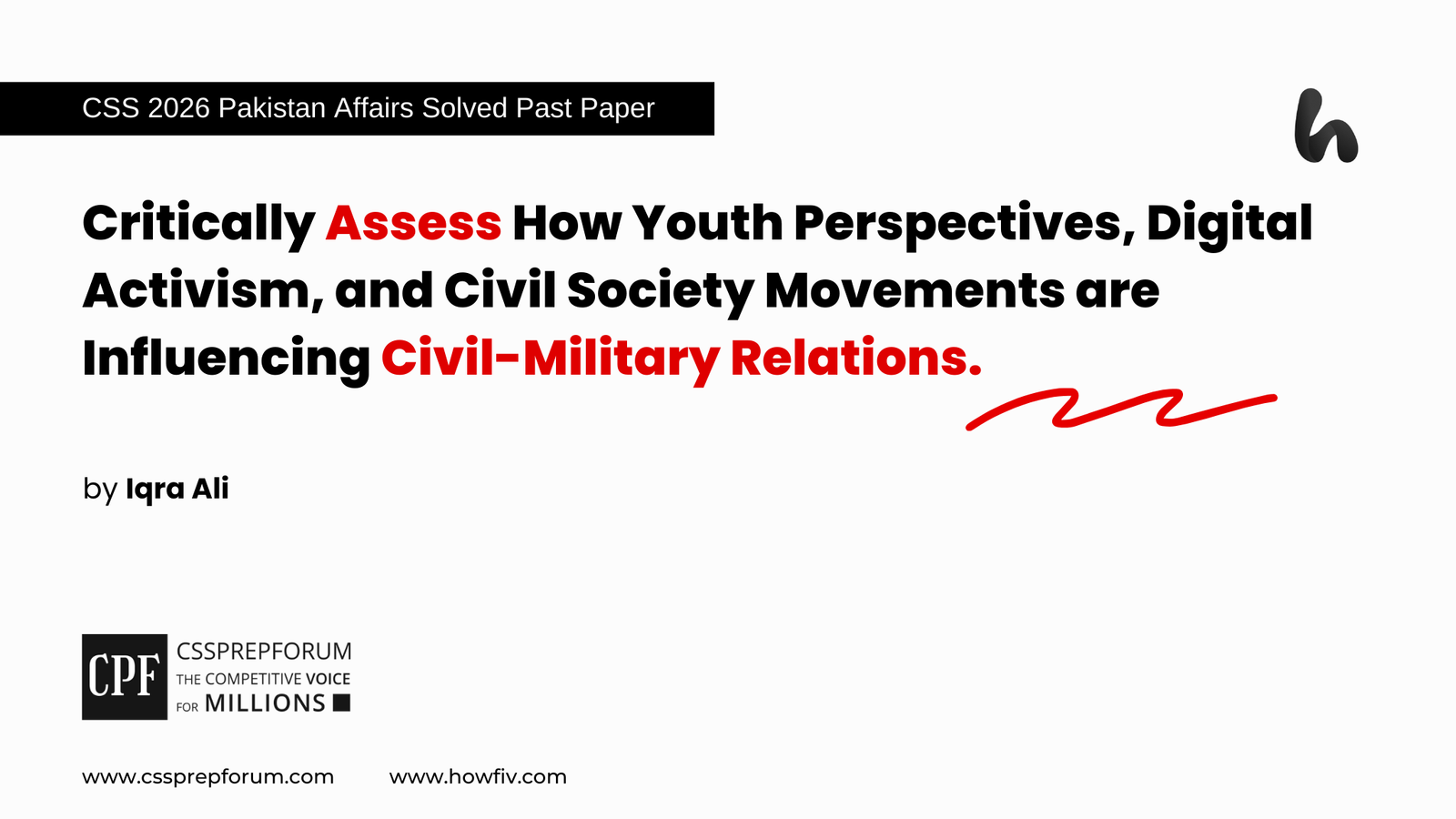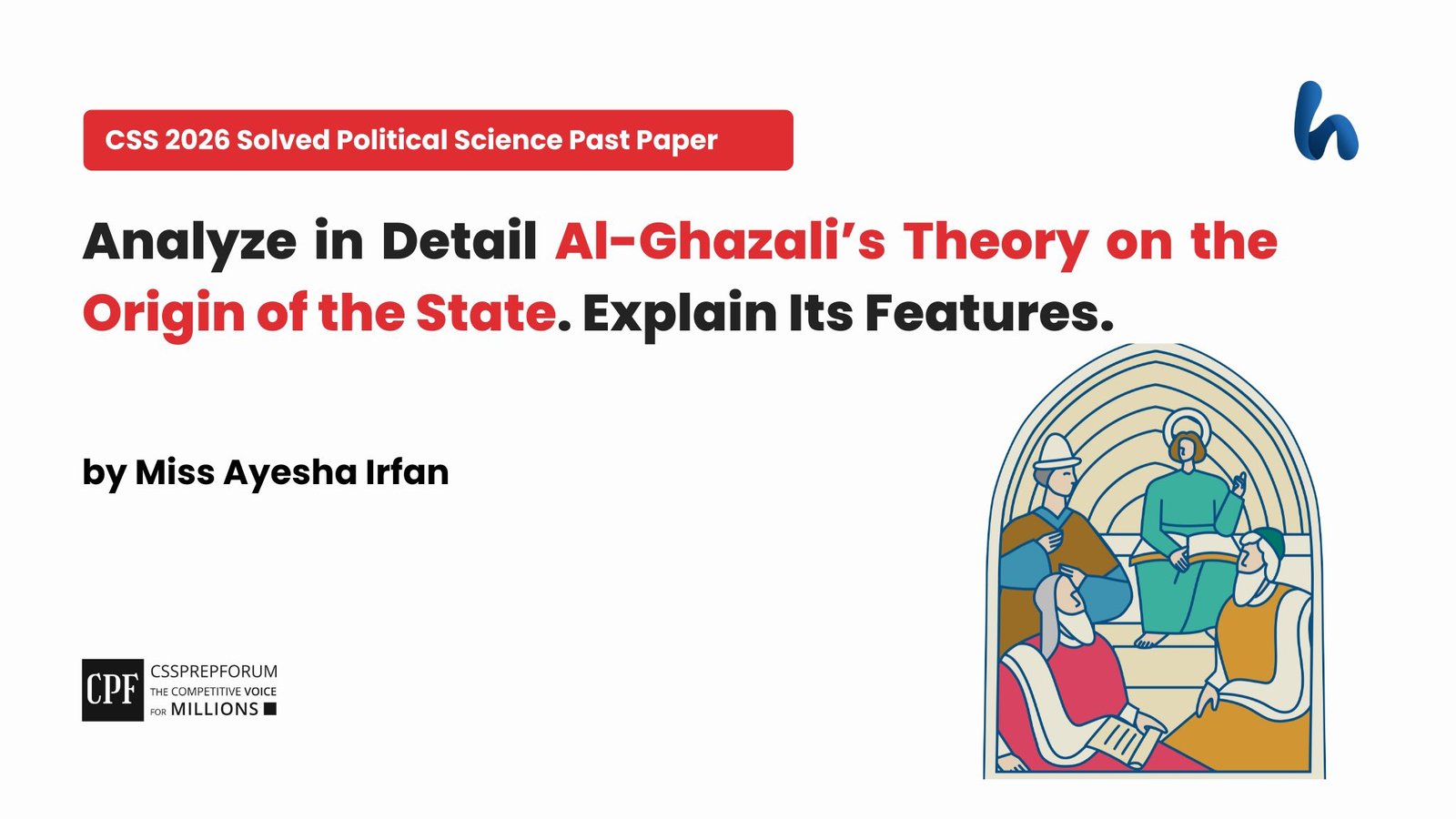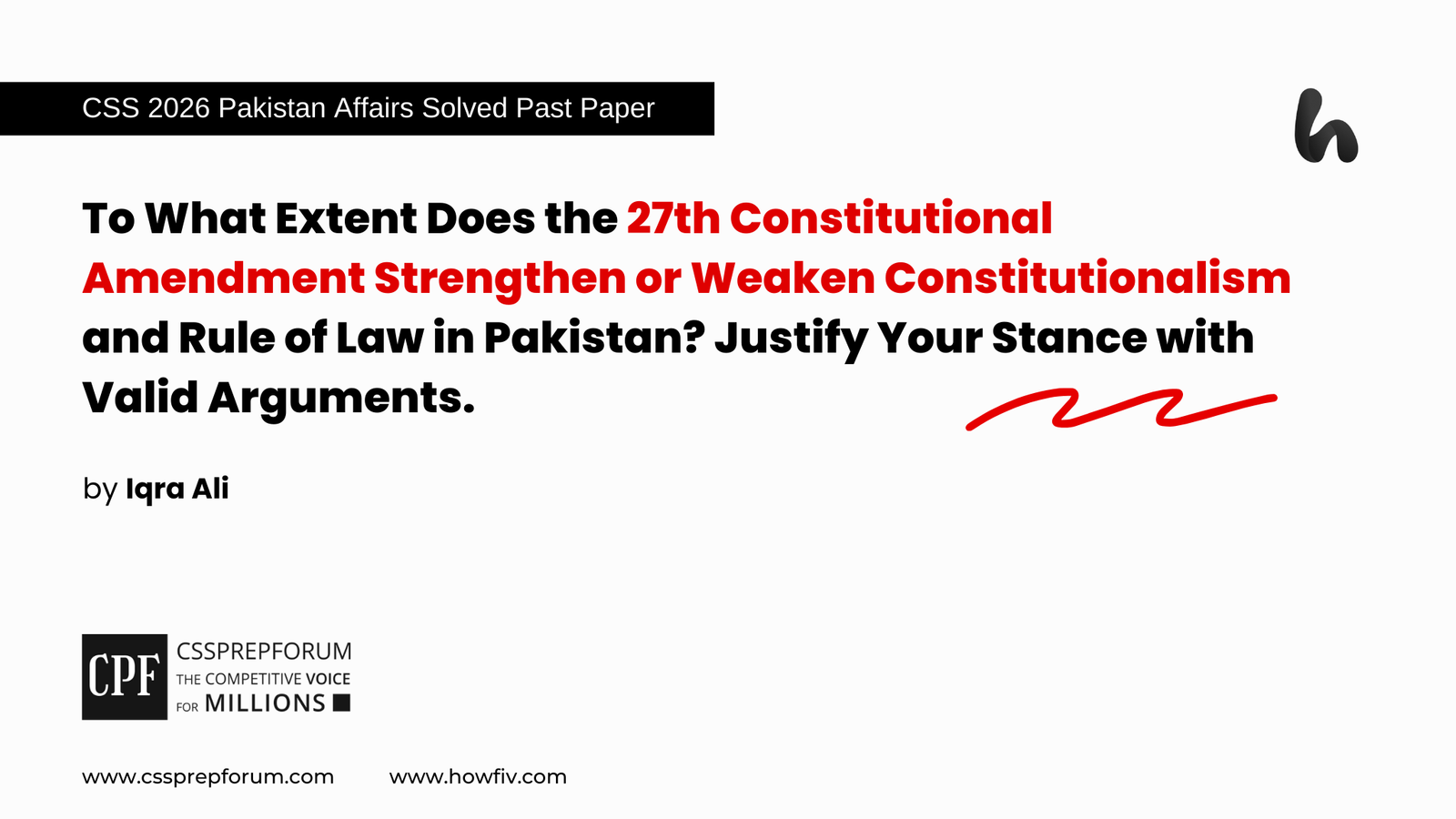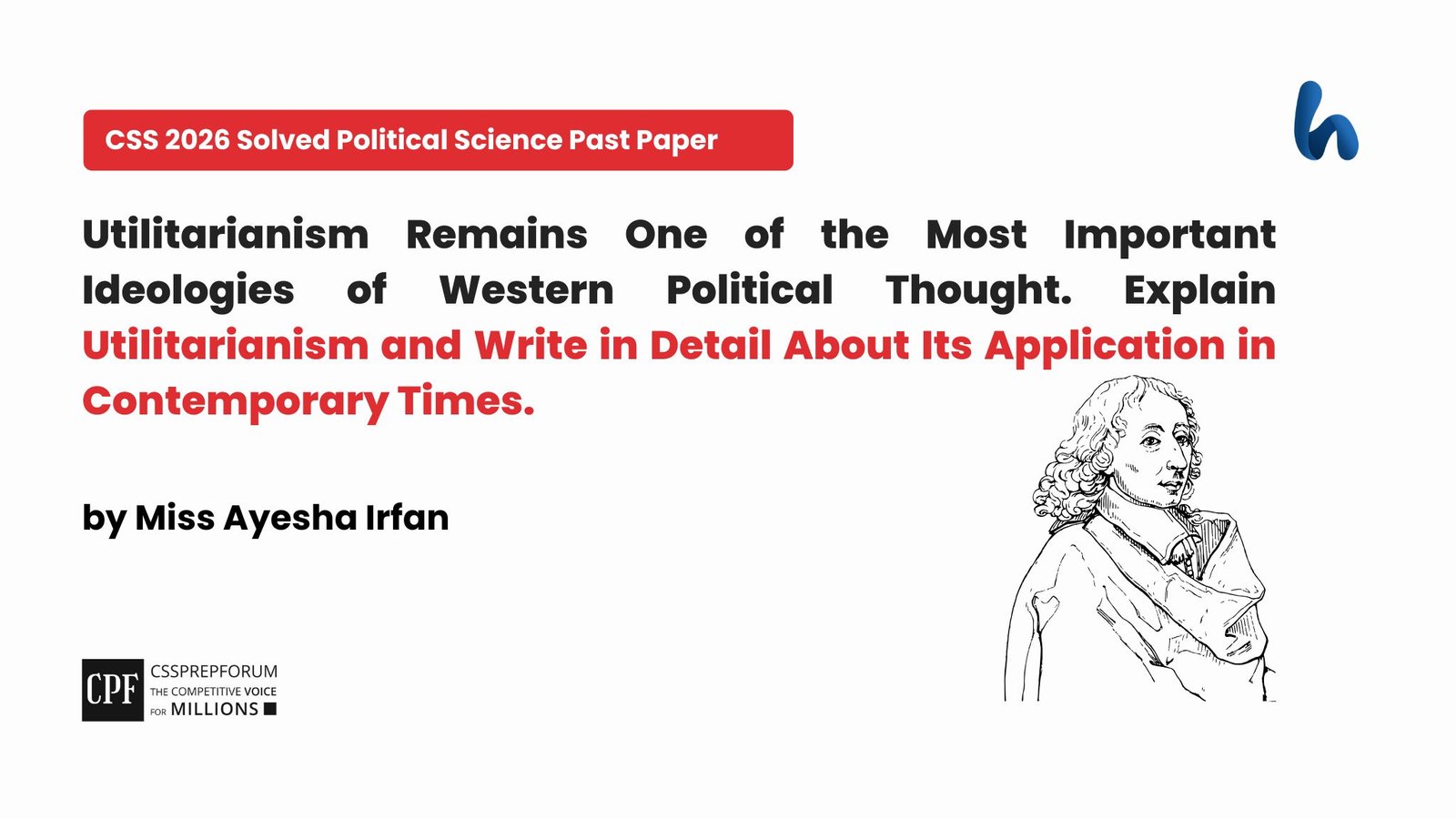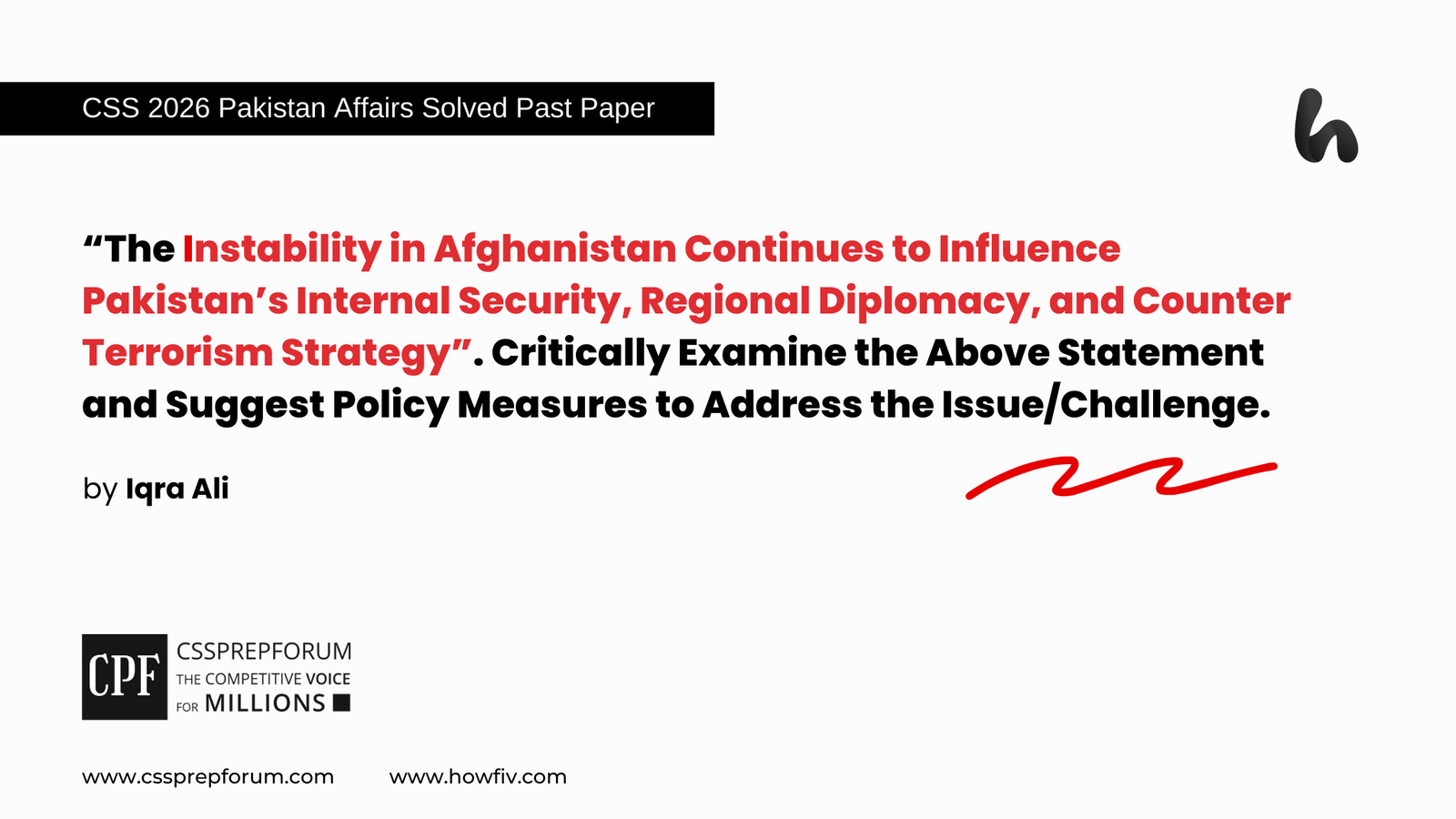This article focuses on the consistently repeated topics in the CSS Islamiat exam, which require analytical and critically informed answers. Core themes include Islamic beliefs, the Prophet’s (PBUH) life, and the Islamic system, alongside contemporary issues like human rights and Ijtihad.

Islamiat stands as a compulsory and high-scoring subject in the Central Superior Services (CSS) examination, playing a pivotal role in a candidate’s overall success. To qualify this paper with flying colours, Miss Ayesha Irfan, Islamiat coach at CSSPREPFORUM and HOWFIV, has meticulously solved all CSS Islamiat past papers from 2010 to 2025 at CSSPREPFORUM, providing aspirants with invaluable experience in understanding examination trends. Beyond understanding the strategy of securing marks, these past papers offer an opportunity to demonstrate a nuanced understanding of Islamic principles, their historical application, and their contemporary relevance. For aspirants, identifying and mastering the most frequently tested topics is crucial for effective preparation. Building on this extensive analysis of the past papers, this article aims to highlight these recurring themes, providing a strategic roadmap for a comprehensive study.
I- Introduction to Islam
- Foundational Themes: Introduction to Islam
The first part of the syllabus forms the conceptual base of the Islamiat paper, and it is also frequently targeted by paper setters to test ideological clarity. Among the various themes under this category, a few stand out for their recurrence.
- Importance of Din in Human Life
This topic delves into the all-encompassing role of Islam as a complete code of life rather than a mere religion. Repeatedly asked in the papers, it demands that students explore how Islam shapes human behavior, societal structures, and ethical worldviews.
- Difference between Din and Religion
The contrast between the term “Din” as a divine, holistic way of life and “religion” as a compartmentalised system is often tested to evaluate a candidate’s depth of understanding. The examiners expect examples from Islamic history, the Qur’an, and the Prophet’s (PBUH) Seerah to support arguments.
- Islamic Beliefs and Their Impact on Individual and Society
This question frequently appears in varying forms. It assesses how core beliefs, such as Tawhid, Risalah, and Akhirah, transform not only individual spirituality but also influence social order, justice, and ethics.
- Fundamentals of Islam and Islamic Worship: Their Spiritual, Moral, and Social Impact
Beyond the rote learning of the Five Pillars, CSS necessitates a comprehensive examination of how practices such as Salah, Zakat, and Hajj influence spiritual consciousness, personal ethics, and community welfare. This area is a staple in the objective and subjective portions of the paper.
2. The Holy Prophet (PBUH): Beyond Seerah
The second part focuses on the life and multidimensional roles of Prophet Muhammad (PBUH), where questions typically demand application-based analytical answers.
- The Prophet (PBUH) as an Administrator
Reiterated frequently in CSS papers, this question evaluates how the Prophet (PBUH) established governance models in Madinah. Candidates are expected to explain the Constitution of Madinah, the delegation of authority, and the justice mechanisms using examples from the Prophet’s era.
- The Prophet (PBUH) as a Military Strategist
This is a recurring favourite, especially in PMS papers. A well-rounded answer must cover his ethical war principles, defensive approach, planning of Ghazawat, such as Badr and Khandaq, and the use of treaties, like Hudaybiyyah, as strategic tools.
- The Prophet (PBUH) as a Peacemaker
Given the contemporary global conflict narrative, this topic is frequently revisited to explore how Islam promotes peace. The Prophet’s methods of negotiation, conflict resolution, and social reconciliation are often examined.
3. Human Rights in Islam: A Modern-Relevant Focus
One of the most frequently tested modern-relevant areas, this section covers issues that resonate globally and are highly examinable.
- Human Rights and the Status of Women in Islam
This is among the top three repeated questions from 2010 to 2025. Candidates must approach it with references from the Qur’an, Sunnah, and legal reforms introduced by the Prophet (PBUH). From inheritance rights to education and consent in marriage, the emphasis is on showing how Islam empowered women centuries ago.
- Dignity of Men and Women
Often clubbed with discussions on equality, this topic explores how Islam recognises the intrinsic worth of all humans regardless of gender, race, or social class. The Qur’anic verse “Indeed, We have honoured the children of Adam” (Surah Al-Isra, 17:70) is central to answering this.
4. Islamic Civilisation, Timeless Characteristics
The section on Islamic Civilisation is another repeatedly examined theme. Candidates are expected not only to define but also to analyse the components of Islamic values critically.
● Characteristics of Islamic Civilisation
Topics such as Tawhid (Monotheism), Self-Purification, Dignity of Man, Equality, Social Justice, Moral Values, Tolerance, and the Rule of Law have appeared in almost every other year.
Each of these traits must be explained with Qur’anic injunctions and Seerah-based examples. This section also serves as a cross-reference base when answering questions from other parts of the paper.
5. Islam and the Contemporary World
This part is one of the most dynamic, with themes that resonate with current global and geopolitical concerns.
- Muslim World and Contemporary Challenges
From issues like sectarianism, extremism, and Islamophobia to underdevelopment, this topic is a favourite of CSS paper setters. Responses should blend historical context, Qur’anic guidance, and current affairs to stand out. An interdisciplinary approach, linking this with governance, human rights, or economic justice, can further strengthen the answer.
6. The Core of CSS Islamiat: Public Administration and Governance in Islam
No other section has gained as much prominence in recent years as this one. Every year, at least two questions in CSS Islamiat are drawn from this segment, highlighting its paramount importance.
- Concept of Public Administration in Islam
This theme underscores Islam’s administrative vision grounded in accountability, consultation (Shura), transparency, and justice. The Prophet’s (PBUH) Madinah model and the rightly guided Caliphs serve as prime case studies.
- Governance Structure in Islam (Shura, Legislation, Sources of Islamic Law)
This recurring question requires aspirants to define the framework of Islamic governance, encompassing consultation (Shura), legislative authority, and the application of the Qur’an, Sunnah, Ijma, and Qiyas. It is often tested in relation to Western democracy, requiring a comparative analysis.
- Governance under Pious Khilafat
Particularly focusing on Hazrat Abu Bakr, Hazrat Umar, Hazrat Uthman, and Hazrat Ali (RA), this question requires detailed knowledge of how each Caliph addressed societal, legal, and administrative issues. Hazrat Umar’s era is most frequently referenced.
- Letters of Hazrat Umar (RA) and Hazrat Ali (RA)
The epistolary directives of these caliphs—on justice, rights of non-Muslims, duties of governors, and ethical leadership, have appeared in every alternate paper in various forms. Candidates must be prepared with key letters and their content analysis.
- System of Accountability (Hisbah) in Islam
A technical yet frequently asked question, it assesses knowledge of institutional mechanisms for ensuring justice and compliance, including the role of the Muhtasib, judicial supervision, and moral policing based on Islamic principles.
7. Islamic Code of Life: Holistic Worldview
The last section often wraps up the paper, demanding a structured understanding of Islamic systems.
- Salient Features of the Islamic System
A broad but crucial question, it covers divine origin, comprehensive nature, balance between rights and duties, and spiritual–material harmony. It’s typically asked every 2–3 years.
- Islamic Social, Political, Economic, Judicial, and Administrative Systems
Each of these systems has been tested separately and collectively. The social system (family, brotherhood, modesty), political system (sovereignty of Allah, Khilafah), economic system (Zakat, prohibition of Riba), and judicial system (independence of judiciary) are highly examinable.
- Procedure of Ijma and Ijtihad
These two are among the most frequently asked and misinterpreted topics. Candidates must distinguish between collective consensus (Ijma) and independent reasoning (Ijtihad) and explain their significance in Islamic jurisprudence, with contemporary relevance, particularly in matters not directly addressed in classical texts.
Cracking the Pattern
Success in CSS Islamiat requires more than just reading; it demands pattern recognition, critical analysis, and structured answers backed by evidence from the Qur’an, Hadith, and Islamic history. From the foundational ideologies of Islam to the modern administrative legacy of the Caliphate, the topics outlined above have consistently formed the core of CSS Islamiat papers from 2010 to 2025. Mastering these most repeated topics in Islamiat is not merely an academic exercise but a journey into the heart of Islamic civilization and its timeless principles. From the foundational beliefs and worship to the exemplary leadership of the Holy Prophet (PBUH), the progressive human rights framework, the unique characteristics of Islamic civilisation, the contemporary challenges faced by the Muslim world, and the meticulously detailed systems of governance and code of life, each section offers profound insights. For CSS aspirants, a thorough understanding and analytical grasp of these themes, supported by relevant Quranic verses and Hadith, will undoubtedly pave the way for success in the examination and a deeper appreciation of Islam’s universal message. The continued excellent work in this area will surely solidify preparation.
A smart aspirant will focus not only on these high-yield topics but also prepare model answers incorporating real-world parallels, Islamic jurisprudence, and a balanced worldview. Islamiat is not a subject to be memorised; it is a worldview to be understood, defended, and applied.

Who is Miss Ayesha Irfan?
Miss Ayesha Irfan is a senior Islamiat coach at CSSPREPFORUM, Howtests, and Howfiv. With a legacy of solving all CSS and PMS Islamiat past papers from 2010 to 2025, she is known for training students to write high-scoring analytical answers that lead to allocations.
Searching for CSS or PMS Solved Islamiat Past Papers?
Are you preparing for CSS or PMS and searching for solved Islamiat past papers, notes, books, PDFs, and MCQs? Explore them for free on Howtests and Cssprepforum. All content is fully solved and written by Miss Ayesha Irfan. For your convenience, the links are provided below, simply click on any to start reading and preparing.


